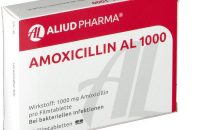Antibiotics for ARVI Treatment
Many people think that there is no sense to appoint antibiotics for ARVI, since it is antibacterial drugs, and do not act on viruses. So why are they still prescribed? Let’s consider this question in details.
ARVI is a common aerosol-transmitted infectious disease that also is transmitted by contacts through unwashed hands, objects, things. The name of acute respiratory viral infection speaks for itself: infection is caused by pneumotropic viruses that infect most organs of the respiratory system.
ARVI Treatment with Antibiotics
If colds are caused by viral infection, it is more logical at first symptoms to take antiviral drugs to carry out detoxification and symptomatic treatment according to indications. The treatment is usually appointed about a week after cold was diagnosed if initial treatment of viral infection was ineffective, patient’s condition is getting worse or remains unchanged.

Besides, often there are situations when due to low immunity, triggered by acute respiratory viral infection, additional bacterial pathologies develop. In this case, antibiotics use is possible and even necessary. These are drugs of complex and multifaceted action, their reception is conducted in compliance with certain precautions: strict compliance with dosage and time of reception, with determining bacterial flora sensitivity, with simultaneous use of some antifungal and immunomodulatory drugs. Therefore, the best solution when choosing the agent – preliminary consultation with a physician or infectious disease specialist, who will advise you the most effective in your particular case preparation.
Do Antibiotics Help in ARVI?
If within a few days after ARVI onset, you notice painful lymphonodes appearance and sore throat, coated tonsils, clicking in ears, long-lasting purulent rhinitis, wheezing in lungs, high body temperature (over three days), antibiotics in such cases are quite justified.
To achieve the desired effect of these drugs, the first thing is to properly select the drug: defined range of action, localization, dosage and admission duration.
In order to achieve positive dynamics, treat the disease and not harm the body, you must strictly adhere to general rules of antibiotics reception:
- appointment of these drugs should be due to presence or possibility of getting a bacterial infection;
- while taking antibiotics, its required constant concentration in blood must be defined: if a doctor has prescribed to take pills 5 times a day, so it should be taken exactly 5 times a day, and you shouldn’t reduce dosage on your own and change treatment regimen, by doing so you will disbalance your and bacterial microflora;
- you should not stop taking pills as soon as first signs of relief appeared, treatment course must complete: interrupted course only weakens bacteria, and for a full recovery is necessary that they are completely destroyed. Not eliminating them completely, you risk falling ill again in the near future or obtaining a chronic form of the disease;
- while taking antibiotics it is necessary to carry out dysbacteriosis preventive measures, as these drugs are detrimental not only to pathogenic but also to healthy intestinal microflora: on the background of the therapy it is recommended to take antifungal agents and drugs that support beneficial microflora in the body;
- for a toxic effect prevention you should drink plenty of fluids, including sour-milk products;
- eat more vitamins, drink juices, if possible spend more time in the sun and fresh air.
When are Antibiotics Prescribed for ARVI?
There are cases when antibiotics are prescribed for acute viral pathologies, and they are far from rare. Of course, taking these drugs is not necessary, without need, however, there are many viable reasons for their appointment:
- presence of chronic often exacerbating middle ear inflammation;
- small children who have signs of unfavorable development: underweight, lack of calcium and vitamin D, weakened immunity, abnormal body functioning;
- presence of chronic body defense system weakness symptoms (frequent inflammations, colds, unreasonable fever, purulent processes, fungal infections, persistent disorders of digestive system, cancer, AIDS, congenital immunity abnormalities, autoimmune pathologies).
Also, antibiotics are effective in some complications:
- purulent infection (sinusitis, nodal involvement, abscesses, phlegmons, bacterial infections of the throat and respiratory system);
- simultaneous development of bacterial tonsillitis (purulent, with streptococcal or anaerobic infection);
- background ear inflammation;
- the inflammatory process in lungs of any etiology.
Such drugs are often prescribed to debilitated patients as the preventive measure in the fight against complications.
What Antibiotics to Take in ARVI?

Antibiotics, that are commonly prescribed for ARVI, are representatives of the following groups:
- penicillins – Oxacillin, Ampicillin sodium, Ampioxum – drugs with broad bacteriostatic and bactericidal action, rapidly absorbed, effectively act on pneumococcal, meningococcal, streptococcal infections;
- cephalosporins – Cephaloridine, Cephalexin, Cefazolin – low-toxic antibiotics, acting on gram-positive and gram-negative bacteria, inhibit even penicillin-resistant strains;
- tetracyclines – Tetracycline hydrochloride, Doxycycline – inhibit protein synthesis in microbial cells, active antibacterial preparations;
- aminoglycosides – Gentamicin, Amikacin – popular drugs for severe infections;
- macrolide antibiotics – Erythromycin, Azithromycin – inhibit bacterial growth;
- other groups of antibiotics – Lincomycin, Rifampicin.
The choice of the remedy is determined by its spectrum of action, a degree of influence on bacterial cells. Before taking medication read instructions or better consult a doctor.
Antibiotics for ARVI in Adults
Such medications are usually not prescribed from first days of the disease. Viral etiology of acute respiratory viral infections provides for first of all antiviral drugs application.
Antibiotic therapy in adults is used in case of the following symptoms:
- long-term (over three days), high body temperature indicators;
- symptoms of general intoxication (headaches, dizziness, nausea, cyanosis);
- wheezing, dyspnea, inability to cough up bronchi contents, heaviness in the chest;
- increased erythrocyte sedimentation rate (ESR);
- increased white blood cells amount;
- the appearance of a visible microbial affected area (cellulitis, abscesses, boils, purulent sinusitis);
- the absence of disease development positive dynamics (despite treatment, pathological symptoms are progressing);
- elderly age and weakened immune system.
Antibiotics for acute respiratory viral infections are also prescribed to adults with mixed and complicated disease form.
Antibiotics for ARVI in Children
Many parents when their child obtains ARVI hurry to give him some antibiotics, sometimes without any reason. There should be no rush with such a therapy, especially when it comes to children.
Here are some principles according to which antibiotics are prescribed for acute respiratory viral infections in children:
- they are used only if there is a large probability or proven bacterial etiology of pathological condition;
- when prescribing antibiotics for treatment, most probable causative agents of infectious diseases are considered, as well as possibility antibiotic treatment of any other disease in recent years is clarified;
- selection of therapeutic effect on child provides for the appointment of drugs with low toxicity;
- many such drugs have age limitations for use;
- the dosage for children is usually determined based on total weight of child’s body.
Uncomplicated acute respiratory viral infections forms do not usually require antibiotics. They are appointed with concomitant inflammation of maxillary sinuses, tonsillitis, otitis, pneumonia symptoms.
Antibiotics for ARVI and Flu
Flu is, in fact, the same viral infection that is characterized, unlike ARVI, by more abrupt onset and possibility of more serious complications developing.
Let’s return to the question of whether a need for antibiotics is the same for acute respiratory viral infections and flu?
Influenza causative agent is also a virus, so unmotivated use of such drugs for flu is not welcome. Firstly, additional toxic effects on liver and stomach, and secondly, possible development of bacterial flora resistance to an antibiotic.
Treatment with antibiotics is necessary to be joined to antiviral and symptomatic therapy only in cases of long-term ongoing fever, chronic respiratory, kidney, cardiovascular system diseases, diabetes, reduced immune defenses. The drug can be administered for secondary bacterial infection prevention.
The treatment should be started only on doctor’s prescription, do not take them independently and without reason.
The List of Antibiotics for ARVI
The most effective antibacterial drugs for ARVI are the following:
- cephalosporins – semisynthetic drugs with a wide spectrum of action. There are three generations of these drugs. The bacteriostatic effect allows using these drugs for any respiratory system infectious diseases. Adults can take drugs in a daily dose of 400 mg, divided into two receptions. Treatment course is 1 – 2 weeks;
- fluoroquinolones (levofloxacin) – differ in rapid absorption and good bactericidal effect. Adults are prescribed 0,5 g a day. Not recommended for use in pediatric practice;
- macrolides (erythromycin and azithromycin) – used for sinusitis, tonsillitis, otitis, pneumonia. These drugs are allowed to receive during pregnancy. Taken 0,25 g 5 – 6 times a day;
- penicillins (penicillin, ampicillin, amoxicillin, oxacillin) – can be used in pediatrics, because they have low toxicity degree. Daily dose is 2 – 3 g, taken 4 times a day.
The treatment course is 1-2 weeks, but not less than 5 and not more than 14 days.
AIf the drug is ineffective, it should soon be replaced by another with higher activity degree against bacteria.
With allergic reaction to an antibiotic, it is necessary to visit a doctor to replace the drug with means of other groups.
The Best Antibiotics for ARVI
Unfortunately, it is impossible to say for sure what the best antibiotic for ARVI should be like. Selection of the drug is conducted individually, taking into account infection severity, patient’s age, and condition, the sensitivity of bacterial flora and patient’s allergic history. If there was one best antibiotic, it would make no sense to create all other antibacterial agents.
However, these drugs are divided into ordinary (penicillin, tetracycline, laevomycetin, erythromycin) and strong (ceftriaxone, etc.), according to the degree of exposure to a microbial cell.
For infectious diseases of mixed etiology treatment, you should choose not just potent antibacterial agents, but antibiotics, active against a wide spectrum of potential pathogens. Sometimes, to achieve maximal effect it is possible to assign combinations of drugs with different antibacterial spectrum.
It is no secret that new generation drugs have a much greater degree of activity and have fewer side effects than antibiotics, for example, created thirty years ago. Such preparations are clarithromycin (klabax, along with affecting bacteria improves immunity) and azithromycin (has a property of sustained effect on bacterial strains).
Drugs can be taken orally or by injection or as a spray.

Many people at the slightest sign of any disease prescribe antibiotics to themselves. This is wrong, as an unreasonable and unqualified use of such agents triggers rapid growth of bacterial cells and mutations, which greatly reduces antibacterial agents effect.
Antibiotics for ARVI should not be taken uncontrollably also because these drugs affect not only specific bacteria but also the whole body.







